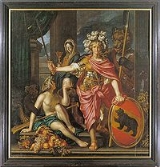
in which the people, or some significant portion of them, have supreme control over the government and where offices of state are elected or chosen by elected people. In modern times, a common simplified definition of a republic is a government where the head of state is not a monarch. The word republic is derived from the Latin
phrase res publica
, which can be translated as "a public affair", and often used to describe a state
using this form of government.
Both modern and ancient republics vary widely in their ideology and composition.
301 San Marino, one of the smallest nations in the world and the world's oldest republic still in existence, is founded by Saint Marinus.
1527 The Florentines drive out the Medici for a second time and Florence re-establishes itself as a republic.
1649 An Act of Parliament declaring England a Commonwealth is passed by the Long Parliament. England would be a republic for the next eleven years.
1793 The first republican state in Germany, the Republic of Mainz, is declared by Andreas Joseph Hofmann.
1849 Hungary becomes a republic.
1905 Norway holds a referendum in favor of monarchy over republic.
1917 Russia is officially proclaimed a republic.
1918 Kaiser Wilhelm II of Germany abdicates after the German Revolution, and Germany is proclaimed a Republic.
1918 Czechoslovakia becomes a republic.
1923 Greece becomes a republic.

